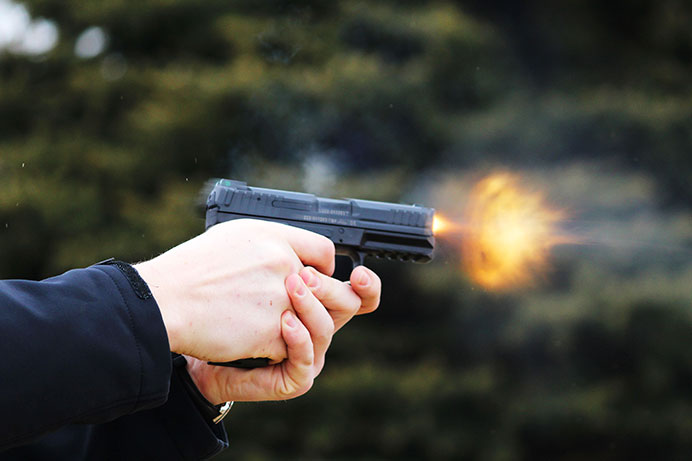By Kaylyn Kluck | [email protected]
The noise levels of gunfire on shooting ranges and hunting grounds in Iowa may get a little quieter.
Gov. Terry Branstad recently signed House File 2279 into law, which legalized the use of gun suppressors in the state. After a similar measure failed last year, the legislation passed 46-4 in the Senate and 78-21 in the House.
“It was a very bipartisan vote,” said Rep. Bobby Kaufmann, R-Wilton.
Suppressors are devices that can be attached to the barrel of a gun to reduce or muzzle firing noise, and they often cost more than $500. The accessories are currently legal in 41 other states. In order to obtain one, citizens will have to go through an application process that includes a background check.
“You don’t just get to go to a store and buy a suppressor,” Kaufmann said. “All it did was allow Iowa to be one of the three dozen states where you can apply to go through the federal guidelines to get one.”
Knox Williams, the president of the American Suppressor Association, said suppressors can help prevent hearing loss for users. He said suppressors reduce the noise of a gunshot by about 20 to 35 decibels, around the same level of sound that earplugs and muffs prevent a shooter from hearing.
“Hearing loss is one of the most common afflictions for the sportsmen and women of the community,” Williams said. “By the time they hit retirement age, a lot of target recreational shooters have to go get hearing aids because either through a singular event or the course of a lifetime, their hearing is degraded from shooting.”
Williams said suppressors are beneficial from a health standpoint, although the suppressors don’t completely silence the sound of a gunshot.
“Despite what a lot of people think, these things don’t silence a gun,” he said. “It’s not what you see in the movies. They’re not ninja-quiet, but they’re a very effective tool.”
Sen. Rob Hogg, D-Cedar Rapids, one of the four senators who voted against the bill, said the measure overturns the suppressor ban signed into law by Branstad in 1983 in a reaction to the assassination attempt on then-President Ronald Reagan.
“Suppressors have been, on occasion, the weapon of choice for assassins,” Hogg said.
The legislation is also flawed because it does not mandate suppressors, he said.
[youtube id=”yMbaRsSZT84″ mode=”normal”]
“If somebody were to go to a shooting range with a suppressor in an effort to protect their hearing, there are going to be other people shooting in that range who do not have suppressors,” he said. “If people want to protect their hearing, they still have to wear personal hearing protective gear. So I don’t think that justification warranted overturning the ban we’ve had in place for 33 years.”
Myrna Loehrlein of the League of Women Voters said the group lobbied against the bill because of general gun-safety concerns.
“Our position is to not weaken the gun-safety laws we already have and to close gun safety loopholes,” Loehrlein wrote in an email. “It is our belief that allowing suppressors would add one more factor of risk in the presence of firearms.”
Catherine Mortensen, the media liaison for the NRA’s Institute for Legislative Action, said suppressors are beneficial because they reduce noise complaints at shooting ranges and protect the hearing of firearm users.
“We want to be good neighbors, and we want to take safety seriously,” she said. “That’s a very important thing for the NRA.”
Mortensen said suppressors are a proven technology helpful for beginning shooters because they reduce the involuntary flinch that comes from anticipation of the sound before firing, especially in a closed range.
“It’s loud and intimidating, and I think the suppressors help people to be able to focus and concentrate because they don’t have to deal with the sound,” she said.
Mortensen said legalizing suppressors in the state was a high-priority piece of legislation for the NRA.
“Iowa now joins 41 other states that allow possession of suppressors, and so it’s putting Iowa in line with what the rest of the country has already been doing,” she said.



